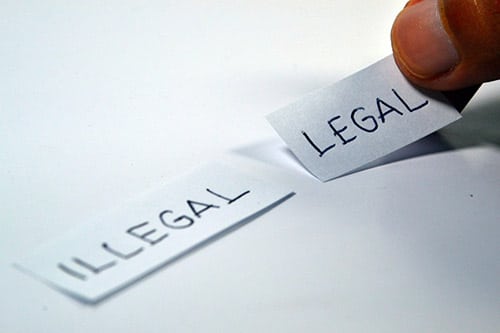What is the Age of Consent in Victoria?
The legal age of consent in Victoria is 16. This means that individuals aged 16 and over can legally engage in consensual sexual activity, provided the other party is not in a position of authority over them, such as a teacher, coach or employer.
In Victoria, engaging in sexual activity with someone below the age of consent is a sexual offence, as those under the lowest age of consent are deemed incapable by law of providing valid consent. However, there are certain exceptions to avoid criminalising consensual sexual activity between young people who are close in age.
The age of consent laws in Victoria strives to find a balance between acknowledging the emerging sexuality of young individuals while safeguarding children from exploitation and abuse by older individuals.
See here for more on the meaning of consent and sex offences.

Romeo and Juliet law
In Victoria, the legal framework regarding consensual sexual activity between teenagers, which is often referred to as “Romeo and Juliet laws” in other jurisdictions, is designed to balance the protection of young people while recognising consensual sexual activity between young people of similar ages.
Victoria allows consensual sexual activity between minors through a similarity in age exemption. This creates a legal age gap, often compared to Romeo and Juliet law, that recognises teenage relationships while still protecting younger adolescents from exploitation by older individuals.
Specifically, under section 49U of the Crimes Act 1958, if a child is between 12 and 15 years old, they can legally consent to sexual activity with someone who is no more than two years older. For example, a 14-year-old could legally engage in consensual sexual activity with someone aged 15 or 16, but not with someone older.
Children under 12 cannot legally consent to any sexual activity under any circumstances, per section 49A, even if the other party is close in age. Victoria’s laws reflect a strong stance on protecting children, and there are several serious offences under the Crimes Act 1958 that criminalise any sexual activity with individuals below the age of consent. This includes charges that apply to both adults and minors, with severe penalties reflecting the gravity of sexual offences involving children Victoria.
Statutory rape
Statutory rape refers to sexual offences involving a minor who is below the legal age of consent, where any form of consent by the young person is considered legally invalid due to their age. In Victoria per the Crimes Act 1958, minors under 16 are not legally able to consent to sexual activity with adults, regardless of the minor’s expressed willingness or perceived consent. So if a 15 year old was to have consensual sex with an 18 year old, this would an example of statutory rape.
Specific offences are outlined for different age groups, with children under 12 years being categorically unable to consent under any circumstances (s49A), and minors aged 12 to 15 being able to consent only in cases where the other party is no more than two years older (s49U). For minors aged 16 or 17, consent is also deemed invalid if the other party is in a position of authority or trust, such as a teacher, coach, or employer (s49C–s49L). These statutory provisions mean that any sexual activity with a minor below the legal age is treated as a serious criminal offence.
Under the Crimes Act 1958, several offences may be considered forms of statutory rape:
-
Sexual Penetration of a Child Under 12 (s49A): It is a strict offence to engage in sexual penetration with a child under the age of 12. Children under 12 are considered incapable of providing consent under any circumstances.
-
Sexual Penetration of a Child Aged 12 to 16 (s49B): A similarity in age defence applies if the accused is no more than two years older than the child and the activity was consensual (s49U).
-
Sexual penetration of a child aged 16 or 17 under care, supervision or authority (s49C): For individuals aged 16 or 17, consent to sex with a person in a position of authority (such as teachers, coaches, or employers) is invalid.

Consent laws Victoria
To understand the application of age of consent laws, it is also essential to understand the meaning of consent in Victoria and the circumstances in which a person does and does not consent. Under section 36 of the Crimes Act 1958, consent is defined as “free and voluntary agreement” to engage in sexual activity to promote the principle that “consent involves ongoing and mutual communication and decision-making between each person” (see objectives in s37A).
A person under 12 years of age is legally incapable of providing consent to sexual activity, regardless of whether the other person is within a close age range. If two children under 10 engage in sexual activity, neither can be prosecuted due to being under the age of criminal responsibility.
However, if a child under 14 engages in sexual contact with a child under 12, the 14-year-old is protected by the presumption of doli incapax if they did not understand the wrongful nature of their conduct. In that case, if the 14-year-old is prosecuted, they can only be found guilty of an offence if the prosecution proves beyond reasonable doubt that they understood the seriousness of the act.
Other offences related to sexual activity with a person under the age of consent in the Crimes Act 1958 include:
- Sexual assault of a child under the age of 16 (s49D)
- Sexual assault of a child aged 16 or 17 under care, supervision or authority (s49E)
- Sexual activity in the presence of a child under the age of 16 (s49F)
- Sexual activity in the presence of a child aged 16 or 17 under care, supervision or authority (s49G)
- Causing a child under the age of 16 to be present during sexual activity (s49H)
- Persistent sexual abuse of a child under the age of 16 (s49J)
- Encouraging a child under the age of 16 to engage in, or be involved in, sexual activity (s49K).
Frequently asked age of consent questions
What is the legal age gap in Victoria?
In Victoria, the legal age gap exemption—also known as the close-in-age or similarity-in-age defence—applies to consensual sexual activity involving young people aged 12 to 15. Under the Crimes Act 1958 (ss 49U & 49V), this exemption allows consensual sexual activity if the older party is no more than two years older than the younger person. For example, a 14-year-old can legally consent to sexual activity with someone aged 15 or 16, but not with anyone more than two years older.
For minors under 12 years old, there is no close-in-age exemption; they are legally incapable of consenting to sexual activity under any circumstances, regardless of the other party’s age. However, if two children under 10 engage in sexual activity, neither can be prosecuted due to being under the age of criminal responsibility. If a child under the age of 14 commits an offence, but does not have the mental capacity to properly comprehend it, they are protected by the presumption of doli incapax.
What is the age of consent in Australia?
Consent is generally defined as free and voluntary agreement to sexual activity, and the age at which a person can legally consent to sexual activity varies across States and Territories in Australia.
In New South Wales, Queensland, Victoria, Western Australia, the Northern Territory and the Australian Capital Territory, the age of consent is 16 years of age. In Tasmania and South Australia, the age of consent is 17 years of age.
While there are certain exceptions to the age of consent rule, there are severe penalties for breaching the age of consent laws. See here for more on the age of consent laws in Australia.
Can a 16-year-old date an 18 year old?
In Victoria, a 16-year-old can consent to sex in a relationship with an 18-year-old, as the age of consent is 16. This means a 16-year-old can consent to sexual activity, including with someone who is 18, provided that the relationship is consensual and the older person does not hold a position of authority over the younger person. Positions of authority, such as teachers, coaches, or employers, make any sexual activity between a 16 year old and an 18 year old a criminal offence.
Can a 16 year old date a 30 year old in Australia?
In Australia, the age of consent for sexual activity varies by state, generally set at 16 or 17 years old, depending on the jurisdiction. Generally, the age of consent is 16 years in most states, including Victoria, WA, NSW, Queensland, the ACT, and the NT. This means that in these areas, a 16-year-old can consent to sexual activity with an adult, including someone significantly older, such as a 30-year-old, provided that the activity is consensual and the older person does not hold a position of authority over the younger person. Positions of authority, such as teachers, coaches, or employers, make any sexual activity between a 16-year-old and an 18-year-old a criminal offence.
In contrast, South Australia and Tasmania have set the age of consent at 17 years. In these states, a 16-year-old cannot legally consent to sexual activity with an adult, making any sexual activity a criminal offence (subject to certain exceptions).
Is it legal for a 15-year-old to date an 18-year-old?
In Victoria, any sexual activity between an 15 and 18 year old is illegal. The age of consent in Victoria is 16, meaning a 15-year-old cannot legally consent to sexual activity. However, Victoria has a close-in-age exemption, sometimes called a “Romeo and Juliet” provision, which allows consensual sexual activity between a 15 year old and someone who is no more than two years older.
This means that a 15-year-old could legally engage in consensual sexual activity with someone up to 17 (as the age gap does not exceed 2 years), but not with an 18-year-old, as this falls outside the close-in-age exemption.
Is it legal for a 14-year-old to date a 16-year-old?
The age of consent in Victoria is 16. However, Victoria’s close-in-age exemption allows consensual sexual activity between young people who are close in age—specifically, if the younger person is at least 12 years old and the older person is no more than two years older. This means a 14-year-old can legally consent to consensual sexual activity with a person who is 15 or 16, but not with someone older.
Can a 12-year-old consent?
The age of consent in Victoria is 16. However, Victoria’s similarity in age exemption allows consensual sexual sex between young people who are close in age—specifically, if the younger person is at least 12 years old and the older person is no more than two years older.
Can a child under 12 consent?
In Victoria, a child under 12 years of age cannot legally consent to any form of sexual activity. This means that any sexual activity with a child under 12 is illegal and constitutes a serious sex offence, with severe penalties for those found guilty.
Victorian law takes this strict stance to protect young children, as they are considered too young to fully understand or agree to the implications of such activities. There are no close-in-age exemptions or defences for engaging in sexual activity with children under 12. A defence of ‘mistaken but honest and reasonable belief’ about a child’s age is not a defence to a sexual offence against a child under 12 (s49ZC).
However, if a child aged under 14 engages in sexual activity with a child under 12, they may have a doli incapax defence available to them if they did not understand the wrongful nature of their act at the time of the offence.
